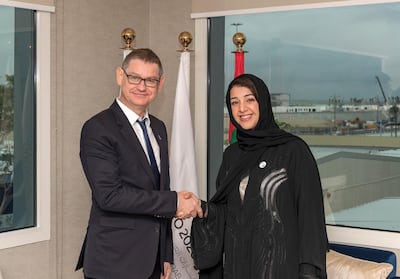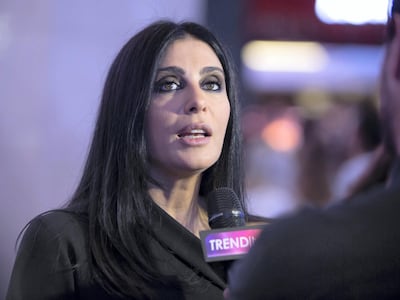Cartier has offered a tantalising glimpse of its Women’s Pavilion, which will open its doors with the rest of Expo 2020 on October 1.
Organisers say this is the first time in more than a century that an Expo will feature a space dedicated to women.
Designed to highlight the contribution women make to society, the space will shine a light on change-makers, female empowerment and gender equality. Under the banner "When women thrive, humanity thrives", the pavilion will focus on how men and women must work together to battle inequality.
The project, three years in the making, has been spearheaded by two remarkable women: Hind Alowais, vice president of the international participants department at Expo 2020, and Sophie Doireau, managing director of Cartier Middle East.
Very much a collaboration, the synergy between the two women is the engine driving this ambitious project forward. With a shared commitment to raising awareness of the gender bias women face on a daily basis, the two women are so in tune, they can practically finish one another’s sentences.
Speaking to The National, amid jokes about what to term a female "bromance", the conversation inevitably turns to the effect of Covid-19 on the project, which was originally meant to be unveiled in 2020.
Alowais explains that despite the initial shock, little actually changed. “For us at Expo, nothing really stopped. Things may have slowed down, but we kept on going. Of course, things had to adapt, but not for one moment did we step back.”
"Not even in the most uncertain time, when it was complete lockdown," Doireau says. "On the contrary, we thought it was more meaningful to have this women's pavilion. When we look back, we look at the figures, the impact that Covid had – and is having – on women, it is really mandatory that we launch this pavilion."
How the pandemic has affected women
Over the past 16 months, closed schools have forced women back into the home to tend to children, while the collapse of the informal economy – a sector largely populated by women – has caused many to lose their income almost overnight.
According to the World Health Organisation, more than 70 per cent of frontline healthcare workers are women, while in Italy and Spain, the overwhelming majority of healthcare workers who have contracted Covid-19 are female. The fact that personal protective equipment (PPE) was designed to primarily fit men is now understood to be the reason.
Meanwhile, according to the World Economic Forum, the pandemic has added another 30 years to the gender gap, meaning it will now take 136 years before women can enjoy the same rights and privileges as men.
“And this [change] is in one year only,” Alowais says. “What Covid has shown us is that progress can be rolled back very quickly. And women have had to bear the brunt of that.”
However, despite the hardships that the pandemic has wrought, it has also triggered a new sense of unity. Both Doireau and Alowais says that this moment can be used as a powerful catalyst to expand women's rights.
“I think what Covid has shown us is that you cannot separate human beings, our human experience," Alowais says. "When the world goes through something like this, that puts everyone in one boat, it reaffirms this idea that we are all in this together.”
'Meaningful alliances and powerful collaborations'
To better reflect our changed world, the content of the pavilion has shifted from its original design a year ago.
“We have adapted our content throughout the pavilion. We now, for example, have a dedicated section on Covid-19 impacting women, with facts and figures that showcase how terrible it is, and how the impact will last for years and years if we don’t do anything," says Doireau.
"As well as all the programming, we will put a lens on the way Covid has been handled," she says, also noting that female-led nations, such as New Zealand, Switzerland and Norway, have fared better against the virus.
“Covid-19 has led us to think differently. Not any more is the topic of gender equality only for governments, institutions and companies. Now it is [about] creating meaningful alliances and powerful collaborations, and coming together with different perspectives that will make things evolve.”
At first glance, Cartier may seem an unlikely champion for women’s rights, yet since it was founded in 1847, it has catered to a largely female clientele, creating pieces that spoke to the women of the day.

In 2006, it launched the Cartier Women’s Initiative (CWI), to support and nurture female entrepreneurs who are still too often overlooked. Thanks to a system of prize money, support and mentorship programmes, the CWI elevates 21 female-run companies a year.
"We believe that empowering women has a multiplier effect: it helps drive economic growth and development, and benefits societies and humanity at large," says Cyrille Vigneron, president and chief executive of Cartier.
For Doireau, such backing is crucial. “When you have leaders speak in this way, and commit and act on it, it’s not just words. Cyrille walks the talk, and we really need these champions to honour the cause and show us, in concrete action, what it means.”
Continuing a legacy of equality
Alowais says this kind of leadership is familiar in the UAE. "I have to remind you of the words of Sheikh Zayed [the Founding Father], when instituting this country, who said: 'Nothing gives me greater pleasure than seeing women take their rightful place in society.'
"In the UAE, progress has been significant, if you think this country was only founded 50 years ago. And when you see the women’s leadership in this country and the breakthroughs, it is phenomenal.”
Four of the artists involved in the Women's Pavilion have now been named. Architect Laura Gonzalez designed the facade of the pavilion, while Lebanese director and Oscar nominee Nadine Labaki will create a film to be shown in the space. Screenwriter and director Melanie Laurent will curate an immersive exhibition, as will French-Tunisian artist eL Seed, in a nod to exclusivity.
“This was a deliberate choice,” says Doireau.
In what promises to be a busy six-month schedule of talks and events, the pavilion will offer an inclusive space for artists, scientists, politicians, entrepreneurs and business leaders to engage in dialogue. There will also be a series called Women in Arabia and Islam, to celebrate females of the region, as the wider aim of the pavilion is to help bring about what Cartier describes as a "cleaner, safer, healthier world".
Alowais is proud of her country's open-minded thinking, and how that is being translated in the Women's Pavilion.
“The country is built around collaboration and tolerance, with 200 nationalities living here. The UAE is so future-facing because of this value that everyone has something to contribute. We can show the rest of the world how business can be done, because business as usual is not going to work any more.”
Doireau says the wider issue is too important to dilute. "As Cartier, we are coming to this pavilion not as a brand, but as a citizen of the world."
In a show of its commitment, Cartier is not even trying to coax customers to buy anything while they are there.
“We have nothing to sell in this pavilion. This is really a very important story for Cartier to tell. We need to stand for a cause that is dear to us.”
In addition to the trials brought about by the global pandemic, the sheer scale of the project meant that every detail was debated at length.
“It’s been a long journey, and where we have arrived is really meaningful, comprehensive and everything we wanted since the beginning," Doireau says. "I am so proud to be here. I am so happy we have this collaboration to showcase what the UAE has done for women. Whether at a ministerial or corporate level, it is meaningful as it is a meritocracy.
"For me, it is just connecting the dots for everything that is important: values, trust and having always in mind to make this world better.”


